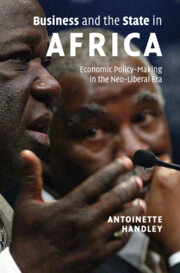Book contents
- Frontmatter
- Contents
- List of figures
- Acknowledgments
- List of abbreviations
- Introduction: the African business class and development
- Part one Institutionalizing constructive contestation
- Part two Business and the neo-patrimonial state
- Conclusion: the business of economic policy-making, comparatively speaking
- Bibliography
- Index
Introduction: the African business class and development
Published online by Cambridge University Press: 22 September 2009
- Frontmatter
- Contents
- List of figures
- Acknowledgments
- List of abbreviations
- Introduction: the African business class and development
- Part one Institutionalizing constructive contestation
- Part two Business and the neo-patrimonial state
- Conclusion: the business of economic policy-making, comparatively speaking
- Bibliography
- Index
Summary
It now seems to me less important that the domestic bourgeoisie should be efficient – technically, financially or otherwise – as capitalists, as individual accumulators, than they should be competent politically as a class: that they should, as a class, recognise the requirements of capital accumulation for capital as a whole and be able to see to it that these requirements are met.
In the late summer of 1981, in a hot and sticky Washington DC, staff members of the World Bank were strategizing how best to release a report entitled Accelerated Development in Sub-Saharan Africa. Some were nervous about how the report might be received – and rightly so. The content of those 200-odd pages proved highly controversial. They would also be enormously consequential, reshaping the role of the state in economies across the developing world for decades to come. In sub-Saharan Africa, the impact of the report would be directly felt through policies of structural adjustment that linked access to development finance to a neo-liberal set of economic policies. Africa's growth prospects, the report argued, had been curtailed by the overreach of the state; what was needed instead was a greater role for unfettered market forces and for the private sector. The report represented nothing less than an agenda to revolutionize the respective roles of the public and private sectors in African economies. The attempt to implement that agenda, however, produced uneven results.
- Type
- Chapter
- Information
- Business and the State in AfricaEconomic Policy-Making in the Neo-Liberal Era, pp. 1 - 26Publisher: Cambridge University PressPrint publication year: 2008



